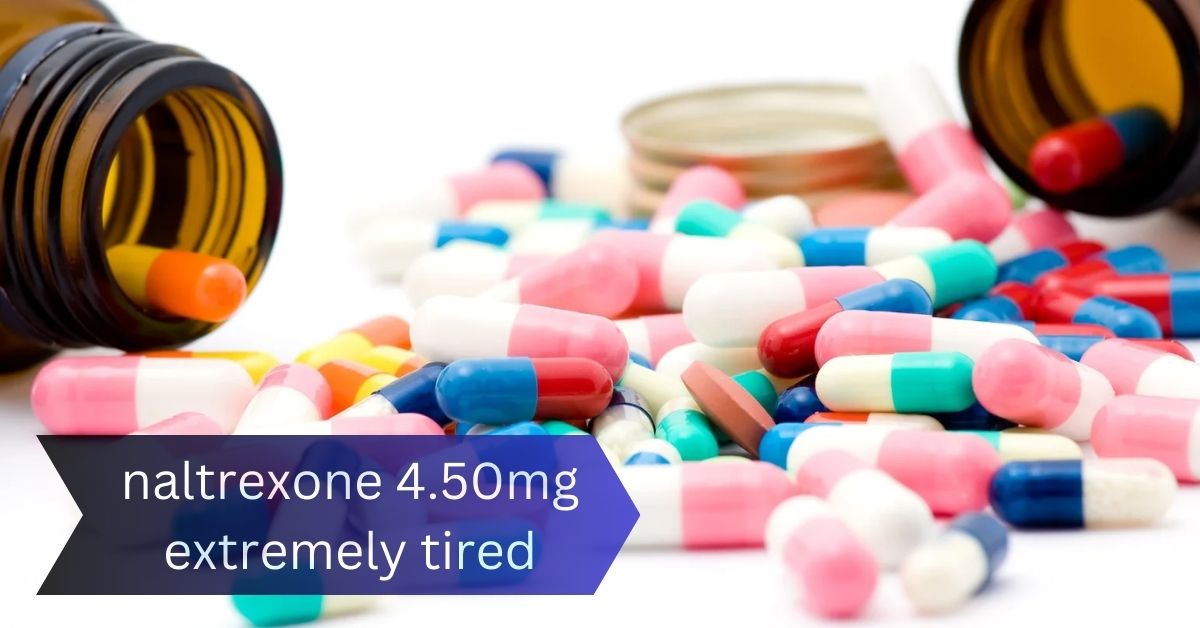Understanding naltrexone 4.50mg extremely tired: Addressing Extreme Tiredness

Naltrexone is a medication widely recognized for its role in treating opioid and alcohol dependence. While effective in managing addiction, many individuals report experiencing fatigue, particularly at specific dosages like naltrexone 4.50mg extremely tired
This article explores the intricacies of fatigue associated with Naltrexone, its causes, and potential management strategies, along with FAQs to address common concerns.
What is Naltrexone?
Naltrexone is an opioid receptor antagonist primarily used to treat opioid and alcohol use disorders. By blocking the effects of opioids in the brain,
it helps reduce cravings and the risk of relapse. Available in oral and injectable forms, Naltrexone is often prescribed to individuals recovering from substance use disorders to aid in their recovery journey.
1. Naltrexone 4.50mg: Dosage and Administration:
The 4.50mg dosage is a common starting point for patients, allowing healthcare providers to monitor how individuals respond to the medication.
Naltrexone can be taken orally once daily, with or without food. However, individual responses to the medication can vary significantly, and side effects such as fatigue can occur.
Understanding Fatigue: Causes and Factors:
1. Pharmacological Effects:
Naltrexone’s mechanism of action can lead to fatigue in some individuals. By blocking opioid receptors, it alters the brain’s chemistry, which may result in feelings of exhaustion. This effect can be more pronounced when starting the medication or increasing the dosage.
2. Individual Metabolism:
Metabolism plays a crucial role in how individuals experience the effects of Naltrexone. Factors such as age, genetics, liver function, and overall health can influence how the body processes the medication. Those with slower metabolism may experience prolonged effects, leading to increased tiredness.
3. Psychological Factors:
Mental health conditions, such as anxiety and depression, can contribute to feelings of fatigue. Naltrexone may interact with underlying mental health issues, intensifying feelings of tiredness. Addressing these mental health aspects is crucial for overall well-being during treatment.
4. Lifestyle Influences:
Factors such as poor sleep, inadequate nutrition, and high-stress levels can exacerbate feelings of fatigue. Individuals taking Naltrexone should prioritize a balanced lifestyle to help mitigate tiredness.
5. Coexisting Medical Conditions:
Pre-existing health conditions, such as thyroid disorders, chronic fatigue syndrome, or anemia, can complicate the experience of fatigue while on Naltrexone. Individuals should discuss any health concerns with their healthcare provider to tailor their treatment plan effectively.
Managing Extreme Tiredness on Naltrexone 4.50mg:
If you’re experiencing extreme tiredness while taking Naltrexone 4.50mg, there are several strategies you can employ to manage your symptoms effectively:
1. Consult Your Healthcare Provider:
The first step in addressing fatigue is to communicate openly with your healthcare provider. They can evaluate your symptoms and determine if adjustments to your dosage or medication regimen are necessary. Do not stop or alter your medication without professional guidance.
2. Prioritize Rest and Sleep:
Quality sleep is essential for overall health. Aim for 7-9 hours of uninterrupted sleep each night. Establishing a consistent sleep schedule and creating a relaxing bedtime routine can help improve sleep quality.
3. Maintain a Balanced Diet:
Eating a nutritious diet can support energy levels. Focus on whole foods, including fruits, vegetables, whole grains, lean proteins, and healthy fats. Avoid excessive caffeine and sugar, as they can lead to energy crashes.
4. Engage in Regular Physical Activity:
While it may seem counterintuitive, regular exercise can boost energy levels and improve mood. Aim for at least 150 minutes of moderate-intensity aerobic activity per week, along with strength training exercises.
5. Manage Stress Effectively:
Chronic stress can exacerbate feelings of fatigue. Explore stress-reducing techniques such as mindfulness, meditation, or yoga to promote relaxation and mental clarity.
6. Stay Hydrated:
Dehydration can lead to feelings of fatigue. Ensure you drink enough water throughout the day to stay hydrated, which can help improve overall energy levels.
Conclusion:
Experiencing extreme tiredness on Naltrexone 4.50mg can be challenging, but understanding the factors that contribute to fatigue and implementing effective management strategies can improve your overall well-being.
Always consult with your healthcare provider for personalized guidance and support as you navigate your treatment journey.
By prioritizing self-care and open communication, you can better manage the side effects of Naltrexone while working towards a successful recovery.
FAQ’S About Naltrexone 4.50mg and Fatigue:
1. What is Naltrexone 4.50mg used for?
Naltrexone 4.50mg is primarily used to treat opioid and alcohol dependence by blocking the effects of opioids and reducing cravings.
2. Why do I feel extremely tired on Naltrexone 4.50mg?
Fatigue may occur due to Naltrexone’s pharmacological effects, individual metabolism, underlying health conditions, and lifestyle factors.
3. How long does fatigue last when starting Naltrexone?
Fatigue may improve after a few weeks as your body adjusts to the medication. If it persists, consult your healthcare provider for guidance.
4. Can I take Naltrexone if I have underlying health conditions?
Discuss any pre-existing health conditions with your healthcare provider to determine the best course of action regarding Naltrexone.
5. Should I stop taking Naltrexone if I experience extreme tiredness?
Do not stop taking Naltrexone without consulting your healthcare provider, as they can help determine the appropriate steps to take.
6. Are there any supplements that can help with fatigue?
Some supplements may help alleviate fatigue, but it’s essential to consult your healthcare provider before adding any new supplements to your routine.
7. How can I manage fatigue while taking Naltrexone?
Strategies include prioritizing sleep, maintaining a balanced diet, engaging in physical activity, managing stress, and staying hydrated.
8. Is fatigue a common side effect of Naltrexone?
While some individuals experience fatigue, it varies from person to person. Discuss your symptoms with your healthcare provider if concerned.
9. Can lifestyle changes help reduce tiredness on Naltrexone?
Yes, adopting a healthier lifestyle with a balanced diet, regular exercise, and stress management techniques can help alleviate fatigue.
10. What should I do if fatigue affects my daily life?
If fatigue significantly impacts your quality of life, consult your healthcare provider to evaluate your treatment plan and discuss potential adjustments.



Leave a Comment